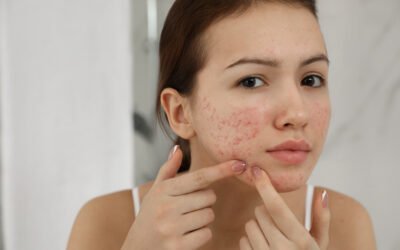The gut-skin connection is gaining a lot of hype right now, and rightly so! However, this hype has led to a load of new products and ‘diets’ on the market, claiming to heal your gut and skin. But does that mean that everyone with a skin issue has gut problems? Should everyone with skin issues be taking probiotics? Digestive enzymes? Glutamine? Testing your gut health can help you cut through all the marketing claims and truly understand what’s best for you. Again, a few options are available when it comes to testing your gut health, but we’ll run through the best ones and how a gut test can help clear acne.
The Gut-Skin Connection
Although your gut and skin might initially seem worlds apart, they are intricately linked through what scientists call the gut-skin axis (also known as the gut-skin connection). The gut has been found to influence the skin in the following ways:
- Nutrient absorption: the gut is where all our nutrients get digested and absorbed. These nutrients then move into the bloodstream and get carried to the skin.
- Microbiome balances: Imbalances in gut bacteria have been shown to affect nutrient absorption, the skin microbiome, hormones and inflammation. All of which affect the health of our skin
- Inflammation: Around 70% of our immune cells reside in the gut. This makes gut health incredibly important for helping to regulate inflammation throughout the body.
Also, when people have gut conditions such as IBS, IBD and coeliac disease, common symptoms of the condition can be skin issues such as rashes, eczema and acne.
The Oversimplified Approach
The standard advice for gut health includes increasing your vegetable intake and taking a probiotic daily. While these general recommendations do offer benefits, they may not translate into clear skin for everyone. You may be eating various vegetables and trying probiotics but still not seeing any visible results in your skin. That’s where a gut test comes in handy to dig a little deeper into what’s really going on inside.
What is a Gut Test?
Also known as a stool test, you might have done one previously for your doctor at some point. However, comprehensive stool tests are a lot more in-depth and can give you a lot more information about everything going on in your gut. Completing a gut test requires doing a stool sample at home and then sending it off in the post. The results then take around 21 days to come back.
These are the main areas a gut test is looking at:
Digestive Function
If you’re eating all the right things but not seeing a benefit, investigating digestive function will give you some answers. Other symptoms of poor digestion can include bloating, reflux, stomach pain, nausea, feeling excessively full after meals, constipation, and diarrhoea. A stool test can check a specific marker known as pancreatic elastase, looking at how well your pancreas works. The pancreas is essential for digestive function as it releases digestive enzymes.
A low pancreatic elastase can show that you’re not digesting your food as well as you should, leading to nutrient deficiencies and microbiome imbalances.
Inflammation
Your gut plays a huge role in regulating inflammation and training your immune system, so checking for an immune response within the gut is very important to help reduce inflammation within the skin. Calprotectin is a marker commonly checked to look for cases of IBD; a high calprotectin indicates an increase in neutrophils within the gut lining. Another marker of an activated immune response is Secretory IgA (sIgA). Think of this as an anti-septic paint that lines your mucosal layer, and it can be increased due to infections, food intolerances, or damaged gut linings, which trigger a response within the immune system. This gives us an idea of what is causing inflammation and where best to target it to reduce inflammation and support the immune system.
Microbiome Balance
There is a delicate balance between beneficial and pathogenic bacteria within the gut. A stool test will help to look at pathogenic bacteria and parasites, beneficial bacteria, opportunistic bacteria, and yeast infections. Opportunistic means they can become a problem if they increase to higher levels.
In some cases, we can see low levels of everything. This can be a good sign that there aren’t any infections, but a problem as there are no good guys to support the body. Finding out the balance of your microbiome is important because it can explain why taking a probiotic alone doesn’t always work. If someone has an overgrowth of bacteria and a raised sIgA, my first thought would be to repair the gut lining, and reduce the growth of bacteria. We wouldn’t do this with a probiotic; we would do it with gut-repairing nutrients and anti-microbial. A probiotic alone would not fix this issue. See why the details are important?
Your personalised gut protocol
Now that you have the insights from the gut test, the next crucial step involves crafting a personalised protocol – as briefly explained above. In clinic, there are a few stool test options, but I like to use the GI Map test. While probiotics are undeniably valuable, it’s essential to recognize that they are not a one-size-fits-all solution. The personalized protocol may encompass tailored dietary adjustments, targeted supplements, and lifestyle modifications to address the specific issues identified through the gut test.
Achieve Healthy Skin through the Glow Getter
Want to look a little deeper into how a gut test can clear acne? We can do it together through The Glow Getter. The Glow Getter sessions allow us to work through the results of your gut test over six months – which gives us a lot of time to work on each part of the gut that needs support and build healthy habits you can stick to long-term. This timeframe allows for the necessary duration for your body to respond, paving the way for visible improvements in your skin health.
If you’ve tried eating more vegetables and taking probiotics already but had no results, let’s get you the answers you need to start your journey to a healthy gut and healthy skin. Take the first step by booking your Glow Getter consultation today.





0 Comments